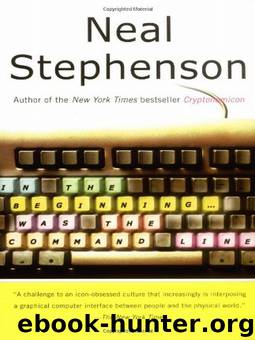In the Beginning... Was the Command Line by Neal Stephenson

Author:Neal Stephenson [Stephenson, Neal]
Language: eng
Format: epub
Tags: Non-Fiction, History, Computers, Operating Systems
ISBN: 9780380815937
Publisher: William Morrow
So when I got home I began messing around with Linux, which is one of many, many different concrete implementations of the abstract, Platonic ideal called Unix. I was not looking forward to changing over to a new OS, because my credit cards were still smoking from all the money I’d spent on Mac hardware over the years. But Linux’s great virtue was, and is, that it would run on exactly the same sort of hardware as the Microsoft OSes—which is to say, the cheapest hardware in existence. As if to demonstrate why this was a great idea, I was, within a week or two of returning home, able to get my hands on a then-decent computer (a 33-MHz 486 box) for free, because I knew a guy who worked in an office where they were simply being thrown away. Once I got it home, I yanked the hood off, stuck my hands in, and began switching cards around. If something didn’t work, I went to a used-computer outlet and pawed through a bin full of components and bought a new card for a few bucks.
The availability of all this cheap but effective hardware was an unintended consequence of decisions that had been made more than a decade earlier by IBM and Microsoft. When Windows came out, and brought the GUI to a much larger market, the hardware regime changed: the cost of color video cards and high-resolution monitors began to drop, and is dropping still. This free-for-all approach to hardware meant that Windows was unavoidably clunky compared to MacOS. But the GUI brought computing to such a vast audience that volume went way up and prices collapsed. Meanwhile Apple, which so badly wanted a clean, integrated OS with video neatly integrated into processing hardware, had fallen far behind in market share, at least partly because their beautiful hardware cost so much.
But the price that we Mac owners had to pay for superior aesthetics and engineering was not merely a financial one. There was a cultural price too, stemming from the fact that we couldn’t open up the hood and mess around with it. Doug Barnes was right. Apple, in spite of its reputation as the machine of choice of scruffy, creative hacker types, had actually created a machine that discouraged hacking, while Microsoft, viewed as a technological laggard and copycat, had created a vast, disorderly parts bazaar—a primordial soup that eventually self-assembled into Linux.
Download
This site does not store any files on its server. We only index and link to content provided by other sites. Please contact the content providers to delete copyright contents if any and email us, we'll remove relevant links or contents immediately.
Learning SQL by Alan Beaulieu(6282)
Weapons of Math Destruction by Cathy O'Neil(6267)
Digital Minimalism by Cal Newport;(5750)
iGen by Jean M. Twenge(5409)
Sapiens by Yuval Noah Harari(5366)
The Age of Surveillance Capitalism by Shoshana Zuboff(4279)
Elon Musk by Ashlee Vance(4122)
Thing Explainer by Randall Munroe(3930)
Apollo 8 by Jeffrey Kluger(3705)
Future Crimes by Marc Goodman(3594)
The Science Book (Big Ideas Simply Explained) by DK(3277)
The Innovators: How a Group of Hackers, Geniuses, and Geeks Created the Digital Revolution by Walter Isaacson(3167)
Who Can You Trust? by Rachel Botsman(3129)
I Live in the Future & Here's How It Works by Nick Bilton(2994)
Infinite Energy Technologies by Finley Eversole(2975)
Steve Jobs by Walter Isaacson(2891)
Dawn of the New Everything by Jaron Lanier(2770)
Chernobyl by Serhii Plokhy(2536)
Ben Franklin's Almanac by Candace Fleming(2524)
